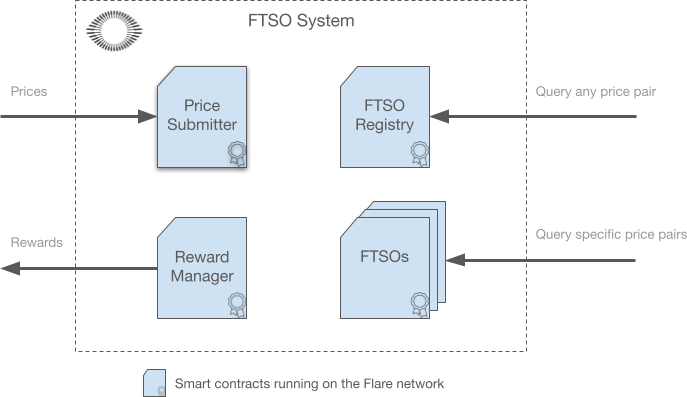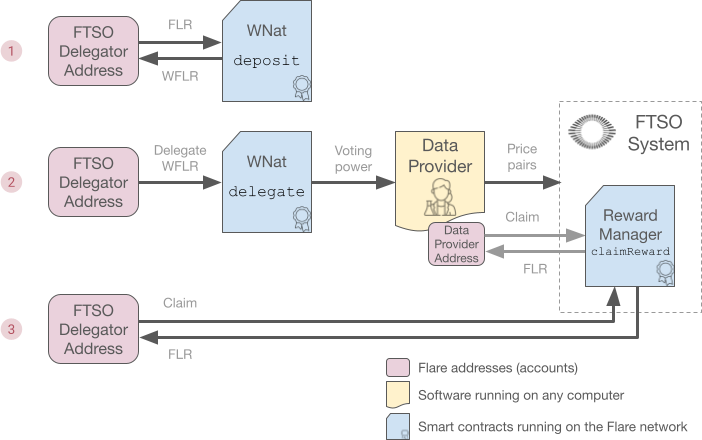FTSO#
The Flare Time Series Oracle (FTSO) is a smart contract that utilizes the Flare network to provide continuous estimations for various data types. This process is completely decentralized, meaning that no single party has control over it, and is highly secure, making it very difficult to disrupt.
This page serves as a guide to understanding and using the FTSO in different applications.
System Architecture#
The FTSO system is composed of multiple smart contracts running on the Flare Network.
Using prices as an example, the following diagram shows the flow of data, queries, and rewards through the FTSO system:

The following list describes the most relevant contracts and their purposes:
-
FTSO: Each data type is handled by its own FTSO contract, including calculation of the filtered data feed.
To retrieve information about a data type, access this contract.
Note
If an FTSO contract is redeployed (for example, to fix a bug), its address will change and apps using it will need to be updated. The FTSO Registry contract below tracks this change for you.
You can retrieve the addresses of all FTSO contracts using the
getAllFtsosmethod in the FTSO Registry. -
FTSO Registry: Aggregates the output of each individual FTSO contract and provides a convenient one-stop API to retrieve all data.
-
Price Submitter: This contract is used by the FTSO data providers to submit their data. Although the contract is called
PriceSubmitter, data is not limited to prices. -
Reward Manager: Use this contract to claim your rewards, whether you are a data provider or a delegator.
-
Wrapped Native (WNat): This contract is not exclusively related to the FTSO system, but it is required to wrap and unwrap native tokens into the
$WFLRand$WSGBthat delegation requires.
Manual Delegation and Claiming#
The following graphic shows the delegation process. You can call methods in several different smart contracts to manually delegate vote power and claim rewards.

Data-Submission Process#
Data submission uses a commit-and-reveal scheme to prevent providers from viewing each other's submissions until a round is over. To speed up the process, both phases are actually overlapped so:
-
All Commit phases happen continuously in so-called 3-minute Price Epochs.
-
Reveal phases happen during the first half (first 90 seconds) of the following Commit phase.
-
The published price information is therefore updated every 3 minutes.
Only a hash of the data is submitted during the Commit phase. Next, in the Reveal phase the actual data is sent. If its hash does not match the previous commitment, the data is discarded.
The submission API is slightly different for the Flare and Songbird networks:
FTSO data providers submit data through the PriceSubmitter contract.
-
Commit: A single hash is needed for each submission.
function submitHash( uint256 _epochId, bytes32 _hash ) external; -
Reveal: After all data is submitted, a single random number must be submitted.
function revealPrices( uint256 _epochId, uint256[] memory _ftsoIndices, uint256[] memory _prices, uint256 _random ) external;
FTSO data providers submit data through the PriceSubmitter contract.
-
Commit: A separate hash is needed for each submission.
function submitPriceHashes( uint256 _epochId, uint256[] memory _ftsoIndices, bytes32[] memory _hashes ) external; -
Reveal: Along with each data submission, a random number must be submitted too.
function revealPrices( uint256 _epochId, uint256[] memory _ftsoIndices, uint256[] memory _prices, uint256[] memory _randoms ) external;
Retrieving Data#
Data produced by the FTSO is publicly available on the Flare and Songbird networks.
All data can be retrieved either through the FtsoRegistry contract or directly through one of the Ftso contracts.
In any case, using the getCurrentPriceWithDecimals method is recommended.
The following examples show how to use this method to retrieve price data.
From the FtsoRegistry contract:
function getCurrentPriceWithDecimals(
uint256 _ftsoIndex
) external view returns (
uint256 _price,
uint256 _timestamp,
uint256 _assetPriceUsdDecimals
);
Where _ftsoIndex is one of the allowed indices returned by getSupportedIndices, for example.
From the FtsoRegistry contract:
function getCurrentPriceWithDecimals(
string memory _symbol
) external view returns (
uint256 _price,
uint256 _timestamp,
uint256 _assetPriceUsdDecimals
);
Where _symbol is one of the allowed symbols returned by getSupportedSymbols, for example.
First you need to obtain the address of the Ftso contract managing the price pair you are interested in.
You can use getSupportedIndicesSymbolsAndFtsos from the FtsoRegistry, for example.
Then call getCurrentPriceWithDecimals on the FTSO directly:
function getCurrentPriceWithDecimals(
) external view returns (
uint256 _price,
uint256 _timestamp,
uint256 _assetPriceUsdDecimals
);
Note
Individual FTSO contracts might be updated periodically, which will change their addresses. Instead of caching these addresses, use the FtsoRegistry.
GetCurrentPriceWithDecimals returns the requested price (the outcome of the previous 3-minute price epoch) in $USD shifting the comma by the amount of decimal places returned in _assetPriceUsdDecimals.
That is, the actual price is _price * 10 -_assetPriceUsdDecimals.
For example, a return value of 2603 with _assetPriceUsdDecimals of 5 means a price of 0.02603 USD (There are only 5 significant decimal places).
A standard Unix timestamp of the last price update is also returned.